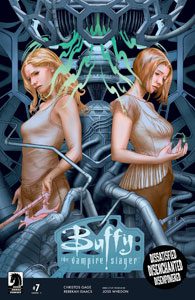Just as “The X-Files” returned for shorter TV seasons in recent years, the “Buffy” comics take a crack at the miniseries format in Season 11, which is only 12 issues long, compared to at least 25 in the previous three seasons. On one hand, important side stories are missing within the overall arc of the US government’s smackdown of the supernatural population. On the other hand, Buffy shines this season – partly affirming superhero traits that have always been there, but also achieving milestones that would’ve been unthinkable in past seasons.
While Christos Gage’s ambitious story is a mix of hits and misses, of great character moments and misfires, there’s no arguing with the art team, which reads like an all-star lineup: Rebekah Isaacs (Issues 1-3, 6-8, 11-12), Georges Jeanty (4-5, 9) and Megan Levens (10) all contribute to this visually impressive season – with Dexter Vines on some inks and Dan Jackson on colors.
“The Spread of Their Evil” (Issues 1-6, November 2016-April 2017)
Probably because it’s designed to be only 12 issues long, Season 11 is narratively tighter than previous seasons — to its detriment in these first six issues. After the US government uses a water-dragon attack on New York City as an excuse (or possibly even a false flag) to put all supernatural beings into a large concentration camp, we follow Buffy, Spike and Willow in the camp and all other characters are dropped from the story except for occasional mentions. Andrew moves to Italy and Giles is off on an adventure to be told in “Giles: Girl Blue.”
An important part of big stories about government power plays against its citizens is showing what’s going on outside the prison walls. Through Buffy’s phone calls to the outside, we learn Xander occasionally gets in fights with anti-magic bigots and that Dawn is still attending college in San Francisco. I suppose a case can be made that their lives are so close to normal that they aren’t worth exploring, but I think the contrast between outside life and camp life should be played up more.
The compressed narrative and small cast also forces and/or inspires Gage to use characters in awkward fashion at times. In Issue 2, when the government orders a special census to identify magic users and Spike fears the worst, Xander says “You sound like one of those guys who thinks the government is coming for their guns. I feel like I should sell you a bunker.” Although it’s true that Xander rarely has his nose in a history book, it doesn’t strike me that he would be a state sympathizer after experiencing the Slayers-versus-soldiers war of Season 8. If he is, I hate that we don’t get into his thought process.
Kennedy or Riley might be better in a state apologist role, but they are nowhere to be found. Granted, their recent character growth doesn’t make them perfect fits. But it’d at least be interesting to learn Kennedy’s take on the Slayers – such as Jordan, the on-the-ground embodiment of tyranny among camp officials – who have joined the government, or Riley’s take on the camps. Also, while it’s clear that the Magic Council set up by Buffy – and also featuring Riley, Giles and Willow in influential roles — at the end of Season 10 has been neutralized or maybe even disbanded, I’d like to know how that comes about.

Within the camp, dubbed the Safe Zone in Orwellian fashion, Gage’s story is pointedly effective. We get a good picture of the details of why such camps are dehumanizing, beyond the fact of their existence. When factions form, the guards don’t care if anyone is killed. When water-breathing demons’ lives are threatened by the poor accommodations, the guards still don’t care. For one, word probably won’t get out. And if it does, it’ll just be argued in political-pundit spheres until the next controversy comes along. Government mistreatment of citizens has a long tradition of failing to foment mass rebellion – and actually inspiring swaths of apologists — and “The Spread of Their Evil” illustrates those truths.
At first, I felt this arc was too on the nose about current events, rather than being creatively metaphorical. Then I realized the story is metaphorical, since we’re talking about magic-users (not immigrants or Middle Easterners or transgendered people or gays or blacks), but it’s so close to “X-Men’s” tradition of mutants standing in for the bogeymen of the moment that it makes “Buffy” seem less fresh and original than I’m accustomed to. And it doesn’t help that TV currently has a glut of “X-Men”-style superhero shows.
As “The Spread of Their Evil” goes on, it gets better. Buffy is in classic hero mode. When Jordan offers her a job with the Safe Zone guards, she says: “I’ll pass. Hard.” She and Willow later make brutal compromises to help people, with Willow taking on the harrowing task of draining some Wiccans of their magic so they’ll be allowed to leave, and Buffy accepting a position as a trustee (she’s a prisoner, but she monitors other prisoners). Spike is likewise in a tough place, dependent on blood rations from his captors; for him, breaking out might be necessary not just for freedom, but for survival.
While I resent that the main “Buffy” cast has been whittled down to three for a story of such large scope, I am curious to see what happens next as our heroes dig further into the mystery of the government’s massive project that combines science and magic.
3.5 stars

“One Girl in All the World” (Issues 7-12, May-October 2017)
Season 11 wraps up in a more brisk, more enjoyable fashion than it begins, but it does so by dropping the heavy themes and moving into plot- and action-oriented storytelling, starting with Buffy, Willow and Spike breaking out of the concentration camp. It slightly feels like one of those TV seasons that rushes to an end, but that’s not exactly what’s going on; it’s more like Gage feels too weighted down by the spy-state, security-state and prison-state themes from “The Spread of Their Evil” and doesn’t want to dig into them further.
As Riley says in Issue 7: “This is the world we live in now, Buffy.” I’ve always hated that sentiment as an argument, but it’s on point as a statement of fact. So given that this is the new reality, the gang (Buffy, Willow, Spike, Faith, Xander and Dawn — with Riley and Sam assisting, mostly off-page) develops a plan to fight back. Conveniently, they don’t have to take on the whole government, just the Big Bad within its ranks who has used the apparatus of the state to develop a magic-drainer/infuser for her own ends.
“One Girl in All the World” is a tremendous character piece for Buffy. She goes through a lot in these 12 issues, including a powerful moment in Issue 8 when she takes on a bigoted street thug to test her fighting skills sans Slayer powers. She wins, but also loses control, and leans up against a tree and cries in a great panel by Isaacs.
Supernatural powers get drained and restored a lot this season, and toward the end, Buffy has all the Slayer power (leaving even Faith drained, which almost makes me want to go into a Comic Book Guy-esque lecture about how Faith had her power before Buffy’s mass-sharing, but I’ll refrain). In Issue 12, Jordan and her lackeys come to Buffy asking for the restoration of their powers – they promise they’ll be good this time. Spike speaks for the reader, telling Jordan to “sod off,” but Buffy – via Willow’s repeat of the Season 7 spell – agrees to re-share the Slayer powers.
While I kind of hate that Jordan gets off the hook for her abuses as a prison guard, it’s an outstanding character moment for Buffy, showing a level of self-confidence we haven’t seen before; she knows the strength she has demonstrated will keep Jordan in line and maybe even set an example Jordan will follow.
Buffy’s confidence also plays into her relationship with Spike. Spike’s loyalty has been established, so now it’s just a question of whether Buffy can commit to mature, adult relationship. In Issue 3, she kisses Spike after a rescue. Faith asks Willow if Buffy and Spike are still together, and Willow notes that “We’re all pleasantly surprised.” In both her superheroism and her relationship, Season 11 marks the point at which Buffy fully embraces mature adulthood, making it different from everything that has come before and going against the traditional Joss Whedon grain of having all relationships collapse.
Whedon’s theory during the TV show’s run was that failed relationships make for good drama – that it’s what the viewers/readers need, if not what they want – but he and Gage are correct that the saga is due for a long-term happy couple. Overdue, in my opinion. I think Xander and Anya should’ve filled that slot back in the day and served as a contrast to Buffy’s relationships, and ultimately an example for her to emulate.
While Season 11 is among the best Buffy character arcs, the shortness of the season means everyone else gets short shrift. But at least they get entertaining stuff to do, notably Xander impersonating the vice president in Issue 10. Willow is in fine magic-using form, although her behind-the-walls relationship with Calliope peters out. Arguably, this is a good commentary, though: Inside the walls, she’s helping individuals like Calliope; outside the walls, she’s a superhero, and it’s harder to build a new relationship.
There’s some cheese sprinkled in Season 11, too. In Issue 10, we see that the government is essentially repeating the Initiative’s project, including the creation of a soldier who is part-human, part-machine. He’s somewhat like Adam, but more so like the dude from “Upgrade” in the mode where the machine has total control. The final battle against the Big Bad is somewhat anticlimactic, although Isaacs and Jackson beautifully illustrate the exchanges of magical blows, and Buffy and Spike do get seriously burned. (Given their supernatural powers, they eventually heal.)
Gage lets most of the story’s bad actors off the hook the same way Buffy lets Jordan off the hook. One person may have been manipulating the governmental power behind the scenes, but that doesn’t change the fact that internment camps, drones and mass registration only happen if officials support them, if a populace elects those officials, and if a good chunk of people cheer-lead for these things and quell opposing voices.
The Scoobies get a happy ending on a personal level, but Gage hasn’t convinced me that “the world (they) live in” has changed because a few particularly evil government agents have been brought to justice.
4 stars
Click here for an index of all of John’s “Buffy” and “Angel” reviews.

